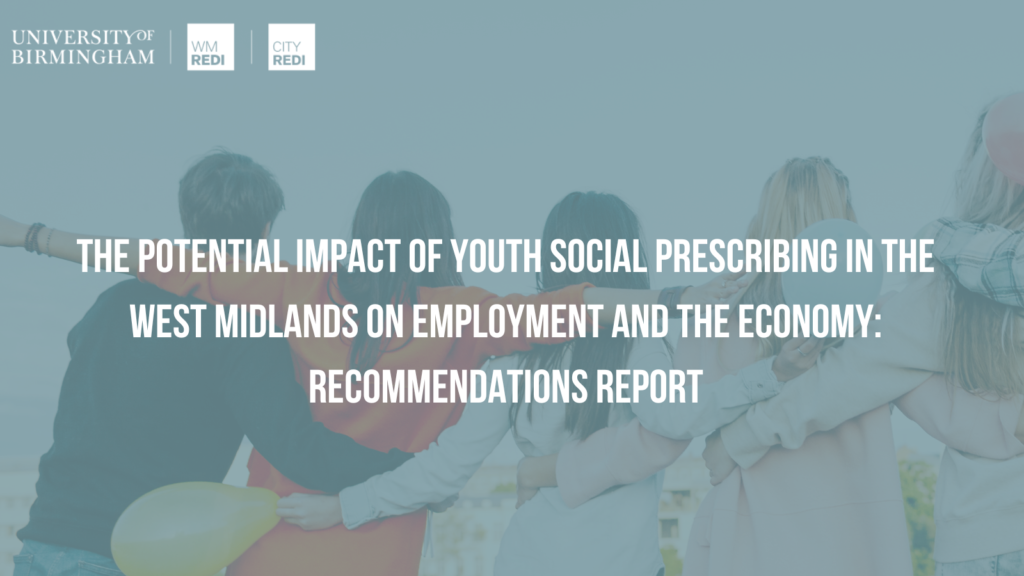
Joanne Mills from the University of Wolverhampton delivers an update on the Institute for Community Research and Development’s current project with WMREDI to identify the potential impact of youth social prescribing within the West Midlands on employment and the economy. Visit the Institute for Community Research and Development (ICRD) webpage.
Social prescribing aims to help people access local, non-clinical services and activities provided by voluntary and community organisations in order to support their social, emotional and practical needs (Buck and Ewbank, 2020). Research undertaken as part of a 15-month collaboration between the Institute of Community Research and Development (ICRD) at the University of Wolverhampton and the West Midlands Regional Economic Development Institute (WMREDI) seeks to examine existing social prescribing provision for young people in the West Midlands and its economic and employability impact.
This multidisciplinary research project builds on ICRD’s recent work with community social prescribing providers and with children and young people to ensure the development of a new frontier of social prescribing is evidence-based from its inception to meet the needs of children and young people. Working with our existing partners in the West Midlands, the project involves a review of existing evidence and will lead to the production of an evaluation framework for commissioners and providers to measure the impact of social prescribing for young people.
Research Digest and a New Survey of the West Midlands
Interest in, and delivery of, social prescribing for young people across the UK is growing, and this project intends to consider the need for, and benefits of, accessing social prescribing interventions for young people in the West Midlands, with a particular focus on its impact on employability and local economy.
In January 2023 we published a research digest. Building on that, we conducted a survey of social prescribing referrers, practitioners, and professionals, to gather first-hand accounts of how and why such services can make an impact on youth employment, and on the region’s economy. We found that the survey responses corresponded with our initial findings from the Research Digest in that any social prescribing provision for young people is relatively new (within the last few years) and that there is very little evaluation to date – particularly on economic and employability impacts. Further, it appears that there is no clear and consistent method of evaluation.

Key Findings from the Survey
The free text elements of the survey allowed us to gather valuable data on the experiences of respondents. Five of the respondents offered social prescribing services for young people, and all agreed that there was a need for such services in the West Midlands.
The following reasons for which young people in the West Midlands are referred to, or seek, social prescribing were noted:
- Social, emotional, and mental health difficulties (SEMH) in mainstream school
- Lack of confidence, mental health, relationship breakdown, homelessness, care leaver and lack of community support
- Anxiety and social isolation/loneliness
- Mental health support, family/peer relationships
While three of the five providers either offered advice on economic areas or signpost to relevant agencies, all respondents agreed that there is a beneficial economic impact to social prescribing – with three providers giving direct and indirect examples of this within their own service, and four respondents agreeing that social prescribing directly/indirectly contributes to bringing people off benefits and other funding support.

Specifically, social prescribing is seen to contribute to a move towards employment and the gaining of positive life skills in the following ways:
- Increased ability to learn skills relevant to employment
- Increased confidence
- Enabling a return to paid work and further education and training
- Increased control over the use of time and activities are undertaken, leading to more positive choices
Recommendations
We found that the survey responses corresponded with our initial findings from the Research Digest in that any social prescribing provision for young people is relatively new (within the last few years) and that there is very little evaluation to date – particularly on economic and employability impacts.
| Research Digest | Survey Findings |
| Dedicated social prescribing provision for children and young people is new but growing. There is currently little published evidence of its effectiveness, but research is underway to address this. | The survey responses correspond with this – any provision for young people is relatively new (within the last couple of years) and there is very little evaluation to date – particularly on economic and employability impacts. |
| There is potential for social prescribing to impact positively on the wellbeing of young people. While there is little tangible evidence to this effect currently, the novelty of this review concerns the further potential for impact on economic and employability aspects – and the links between these and wellbeing. | 5 respondents offer social prescribing services for young people, and all agreed that there was a need for social prescribing for children in the West Midlands. Potential economic and employment impacts of social prescribing reported included: Returning to work; Gaining transferable skills; Building confidence and aspirations; and Improving engagement with education which in turn improves opportunities for work. Further, social prescribing can be seen to play a role in moving young people away from benefits and into employment – Through increasing confidence and making more positive choices. |
| The benefits of social prescribing (related to employment) can include developing personal skills, including building resilience and relationships, which could be transferable to the workplace. There is the potential for social prescribing to have benefits both for the individual and the economy, particularly from those services which focus on financial and employment support. These positive aspects of social prescribing would be of benefit to young people in the West Midlands. | Identified impacts of social prescribing for young people include: promoting physical and mental wellbeing; A positive, supportive community; Improved confidence; Developing new interests; and Increased engagement with school and their community.
|
| The benefits of social prescribing (related to employment) can include developing personal skills, including building resilience and relationships, which could be transferable to the workplace. There is the potential for social prescribing to have benefits both for the individual and the economy, particularly from those services that focus on financial and employment support. These positive aspects of social prescribing would be of benefit to young people in the West Midlands. | Identified impacts of social prescribing for young people include: promoting physical and mental wellbeing; A positive, supportive community; Improved confidence; Developing new interests; and Increased engagement with school and their community.
|
Table 1: Comparison of key findings from initial research digest and primary data collection survey
Our research to date shows that there is clearly a need for specific social prescribing services for young people in the West Midlands, to support both mental health and wellbeing and for employment. However, such a provision is in its infancy, and further evaluation is required specifically for the age group in question. Both the research digest and the survey findings illustrate the potential benefits of social prescribing however the survey responses also highlight the need for a more interconnected approach to provision and a greater understanding of the value of provision which is already available. Further, it appears that there is no clear and consistent method of evaluation. This is an area which is currently being considered within the sector, but it may be some time until there is a solution to this.
Next steps
The next stage of this project is to develop an evaluation framework to enable commissioners and providers to understand the impact of their social prescribing work on young people. This will be published later this year and freely available for any organisation to use.
View and download the summary report.
Visit the project page – Social Prescribing for Young People in the West Midlands: The Potential Impact on Employment and the Economy
This blog was written by Joanne Mills, Research Associate ICRD, University of Wolverhampton.
Disclaimer:
The views expressed in this analysis post are those of the authors and not necessarily those of City-REDI, WMREDI or the University of Birmingham.
